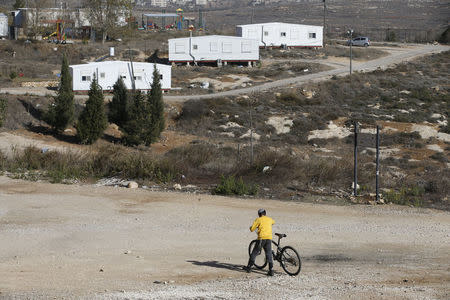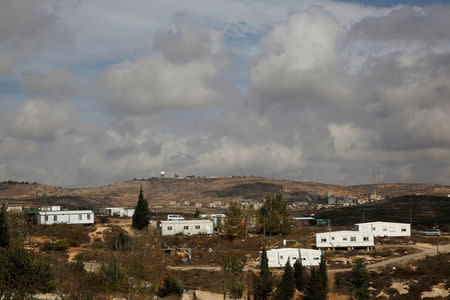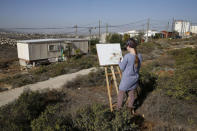Netanyahu in high stakes gamble with new settlement bill
By Maayan Lubell JERUSALEM (Reuters) - Prime Minister Benjamin Netanyahu's support for a bill that would legalize Israeli settlement homes on private Palestinian land in the West Bank is seen in Israel as another feint in a power struggle within his ruling right-wing coalition. But critics in Israel and abroad fear that Netanyahu's machinations aimed at appeasing political partners could have grave consequences internationally, even if the law does not survive likely court challenges. Preliminary approval for the bill granted by parliament on Monday has alarmed the United States, European Union and United Nations, raising the possibility of some sort of U.N. resolution before President Barack Obama's term is up in January. Israeli officials are also concerned that the bill could provide grounds for prosecution by the International Criminal Court in The Hague. It prompted particularly strong criticism from Germany. Netanyahu himself cited possible court action when he initially opposed the legislation promoted by the far-right Jewish Home party and its leader, Naftali Bennett. Palestinians condemned the bill as a land grab in territory they seek for a state. But for the fourth-term prime minister, failure to support the bill would have ceded ground to Bennett in their pursuit of conservative voters that form the power base of both Jewish Home and Netanyahu's Likud. "Naftali Bennett has scared him more than the U.S. administration and more than the European Union. Even though Netanyahu has been prime minister for 11 years, he still remains more a politician than a leader," Amnon Abramovitz, political analyst for Israeli Channel Two, told Reuters. The bill passed its first reading in the legislature with 58 lawmakers voting in favor and 51 opposed. It will require two more votes, probably next week, to become law. The legislation could ultimately be overturned by Israel's Supreme Court, where human rights groups are widely expected to challenge the effective expropriation of privately owned land. Some political commentators in Israel have suggested that Netanyahu could be relying on the court to kill the bill. Netanyahu has been searching for a way to avoid a confrontation with settlers over the court's order to evacuate Amona, the largest settlement-outpost in the West Bank, by Dec. 25. Talia Sasson, a former state prosecutor who in 2005 led an inquiry into outposts commissioned by then-prime minister Ariel Sharon, said the bill was "a political stunt" to keep the coalition together. "The prime minister will come out looking good to his supporters once again -- after all, (it will be seen that) he tried to legalize the theft of lands in the West Bank, and it was the Supreme Court that got in his way," Sasson wrote in Maariv newspaper. OUTPOSTS In the five decades since Israel captured the West Bank, it has built about 120 formal settlements on the territory. Most of the world deems them illegal and an obstacle to peace with the Palestinians, who aim to establish a state in the West Bank and Gaza Strip with East Jerusalem as its capital. As well as those settlements, which Israel fully supports, settlers have established more than 100 outposts, many on hilltops across the West Bank, often with tacit government support. Under the new bill, 55 of the outposts will have official sanction, according to Israeli settlement watchdog Peace Now. Compensation would be offered to Palestinian land owners. The deeper the government becomes involved in backing settlement activity the worse it could be for Israel, said Aeyal Gross, a professor of international law at Tel Aviv University. Once the law is on the books, Gross said, it will "add a level of illegality to the existing illegality of the settlements". Saeb Erekat, secretary-general of the Palestine Liberation Organization, said Israel's action stemmed from a "culture of impunity" in which Israeli leaders believed the international community would not take action against settlement activity. "We call upon all states of the United Nations, particularly Security Council members, to support a forthcoming resolution on settlements," Erekat said in a statement on Tuesday. "Additionally, we will provide the International Criminal Court with information about this and other steps taken by the Israeli government," he said. Far-right parties have been emboldened by Donald Trump's victory in the U.S. presidential election in November. Shortly after Trump's election, Bennett, who advocates Israeli annexation of part of the West Bank, announced: "The era of the Palestinian state is over." Trump has pledged to move the U.S. embassy from Tel Aviv to Jerusalem, a city that Israel regards as its capital -- a claim that has not won international recognition. Yossi Verter, a political analyst at the left-leaning newspaper Haaretz, said the power of the settler lobby had grown out of all proportion. Settlers and their supporters, he wrote, "have this government and the prime minister wrapped around their little fingers". (Editing by Jeffrey Heller and Sonya Hepinstall, Larry King)
















